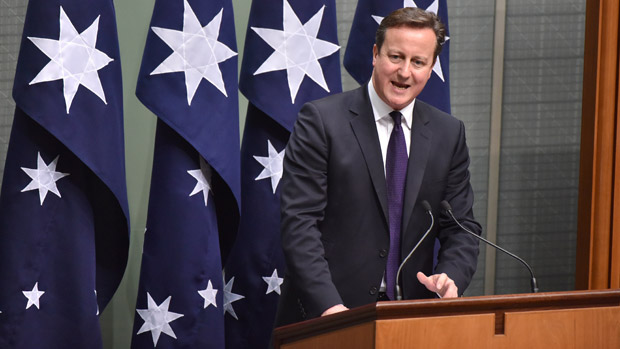New powers to stop jihadists returning to UK revealed by PM
Cameron wants to remove passports from anyone suspected of joining a violent extremist group

A free daily email with the biggest news stories of the day – and the best features from TheWeek.com
You are now subscribed
Your newsletter sign-up was successful
David Cameron has announced plans to stop suspected jihadists returning home to the UK from Syria and Iraq.
Police would be given the power to cancel suspected jihadists' passports for up to two years under new Temporary Exclusion Orders.
Border officials would also be able to take passports from anyone suspected of travelling to join a violent extremist group, without the consent from the Home Secretary that is needed under current law.
The Week
Escape your echo chamber. Get the facts behind the news, plus analysis from multiple perspectives.

Sign up for The Week's Free Newsletters
From our morning news briefing to a weekly Good News Newsletter, get the best of The Week delivered directly to your inbox.
From our morning news briefing to a weekly Good News Newsletter, get the best of The Week delivered directly to your inbox.
Airlines would be compelled to share passenger data, suggesting planes carrying suspected jihadists could be turned away from Britain.
In a speech to the Australian parliament in Canberra, the Prime Minister said the action was needed to deal with the threat posed by more than 500 Britons who have travelled to fight in Syria and Iraq.
Action is needed to counter the "twisted narrative" of Islamism "that has seduced some of our people", he said.
However, The Times notes that jihadists could still insist on travelling back to Britain, but would have to submit to prosecution or close monitoring.
A free daily email with the biggest news stories of the day – and the best features from TheWeek.com
The proposals, which form part of the Counter-Terrorism Bill, due to be published before the end of the month, mark a slight retreat from Cameron's original proposals in September to altogether remove passports from suspected jihadists. This was rejected by Liberal Democrats, who said it broke international law.
The plans "could yet founder on legal challenges", says The Times. For example, it is not clear why countries such as Germany, France and Turkey should accept responsibility for Britons made subject to the Temporary Exclusion Orders.
Human rights lawyers are also likely to argue that placing individuals on a "no-fly" list amounts to rendering suspects stateless, "something which is forbidden under at least two UN conventions", says the newspaper.
BBC political correspondent Robin Brant describes the plan as "highly contentious" and says there are "serious concerns about whether it is workable given other established laws on citizenship, immigration and human rights".
-
 What to know before filing your own taxes for the first time
What to know before filing your own taxes for the first timethe explainer Tackle this financial milestone with confidence
-
 The biggest box office flops of the 21st century
The biggest box office flops of the 21st centuryin depth Unnecessary remakes and turgid, expensive CGI-fests highlight this list of these most notorious box-office losers
-
 What are the best investments for beginners?
What are the best investments for beginners?The Explainer Stocks and ETFs and bonds, oh my
-
 Epstein files topple law CEO, roil UK government
Epstein files topple law CEO, roil UK governmentSpeed Read Peter Mandelson, Britain’s former ambassador to the US, is caught up in the scandal
-
 Iran and US prepare to meet after skirmishes
Iran and US prepare to meet after skirmishesSpeed Read The incident comes amid heightened tensions in the Middle East
-
 Israel retrieves final hostage’s body from Gaza
Israel retrieves final hostage’s body from GazaSpeed Read The 24-year-old police officer was killed during the initial Hamas attack
-
 China’s Xi targets top general in growing purge
China’s Xi targets top general in growing purgeSpeed Read Zhang Youxia is being investigated over ‘grave violations’ of the law
-
 Panama and Canada are negotiating over a crucial copper mine
Panama and Canada are negotiating over a crucial copper mineIn the Spotlight Panama is set to make a final decision on the mine this summer
-
 Why Greenland’s natural resources are nearly impossible to mine
Why Greenland’s natural resources are nearly impossible to mineThe Explainer The country’s natural landscape makes the task extremely difficult
-
 Iran cuts internet as protests escalate
Iran cuts internet as protests escalateSpeed Reada Government buildings across the country have been set on fire
-
 US nabs ‘shadow’ tanker claimed by Russia
US nabs ‘shadow’ tanker claimed by RussiaSpeed Read The ship was one of two vessels seized by the US military